Deep Dive Analysis: Petroleum Marketing and Distribution in Nigeria
VerifiedAdded on 2020/09/03
|44
|6638
|298
Thesis and Dissertation
AI Summary
This dissertation delves into the significant challenges impacting the marketing and distribution of petroleum products within Nigeria, with a specific focus on Capital Oil plc. The study meticulously examines the various issues hindering the performance of oil and gas companies in Nigeria, highlighting the crucial role of the petroleum industry in the nation's economic development. It identifies key players, including refineries and petrol stations, and their contributions to the market. The research investigates the challenges in distribution networks, inefficient management, and market dynamics. The dissertation employs a thorough methodology, including literature reviews, research design, and data analysis. Findings reveal significant transportation issues, inadequate petrol station infrastructure, and ineffective distribution channels. The study concludes with recommendations for improving marketing and distribution strategies, suggesting ways to enhance performance within the Nigerian petroleum sector, and offers insights for further academic research on the subject.
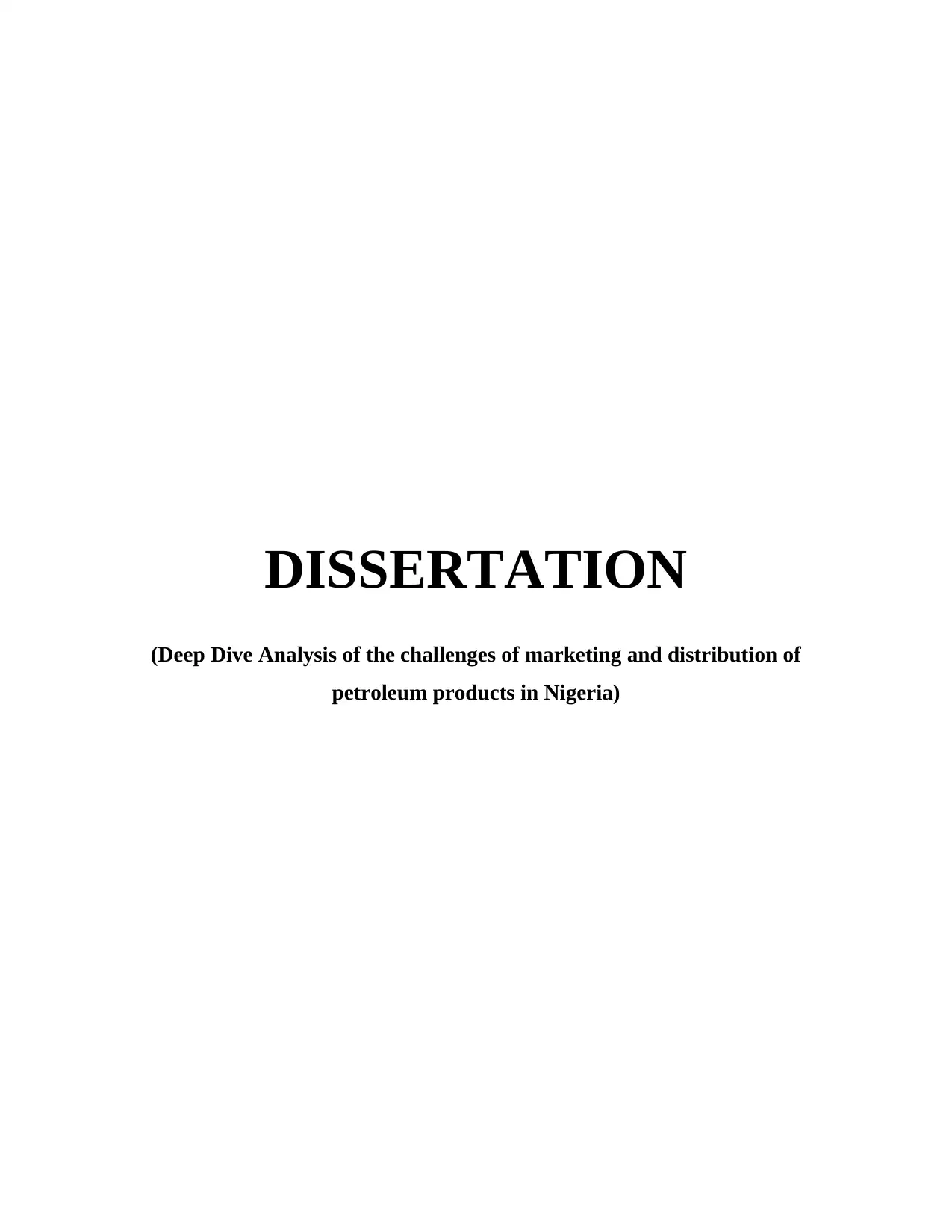
DISSERTATION
(Deep Dive Analysis of the challenges of marketing and distribution of
petroleum products in Nigeria)
(Deep Dive Analysis of the challenges of marketing and distribution of
petroleum products in Nigeria)
Paraphrase This Document
Need a fresh take? Get an instant paraphrase of this document with our AI Paraphraser
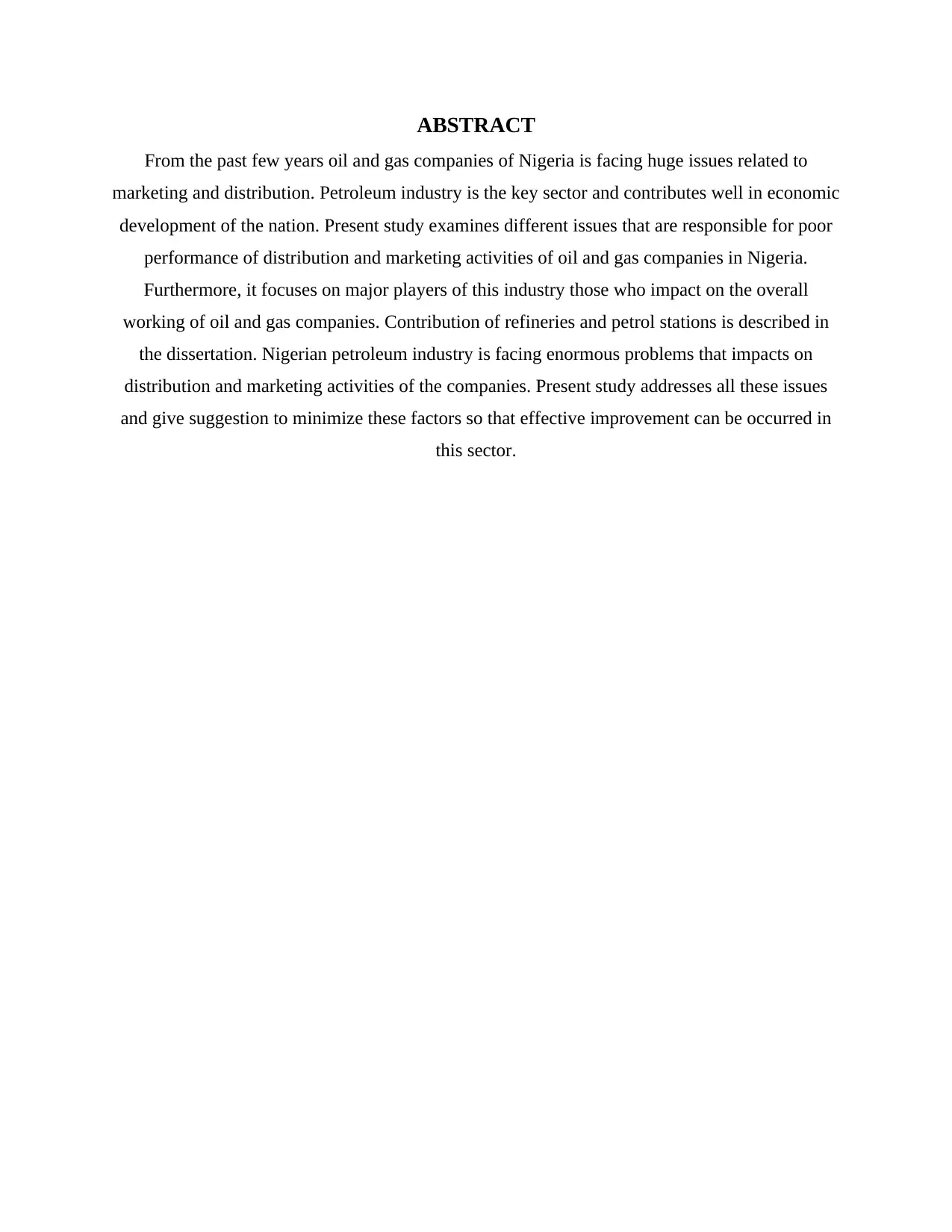
ABSTRACT
From the past few years oil and gas companies of Nigeria is facing huge issues related to
marketing and distribution. Petroleum industry is the key sector and contributes well in economic
development of the nation. Present study examines different issues that are responsible for poor
performance of distribution and marketing activities of oil and gas companies in Nigeria.
Furthermore, it focuses on major players of this industry those who impact on the overall
working of oil and gas companies. Contribution of refineries and petrol stations is described in
the dissertation. Nigerian petroleum industry is facing enormous problems that impacts on
distribution and marketing activities of the companies. Present study addresses all these issues
and give suggestion to minimize these factors so that effective improvement can be occurred in
this sector.
From the past few years oil and gas companies of Nigeria is facing huge issues related to
marketing and distribution. Petroleum industry is the key sector and contributes well in economic
development of the nation. Present study examines different issues that are responsible for poor
performance of distribution and marketing activities of oil and gas companies in Nigeria.
Furthermore, it focuses on major players of this industry those who impact on the overall
working of oil and gas companies. Contribution of refineries and petrol stations is described in
the dissertation. Nigerian petroleum industry is facing enormous problems that impacts on
distribution and marketing activities of the companies. Present study addresses all these issues
and give suggestion to minimize these factors so that effective improvement can be occurred in
this sector.
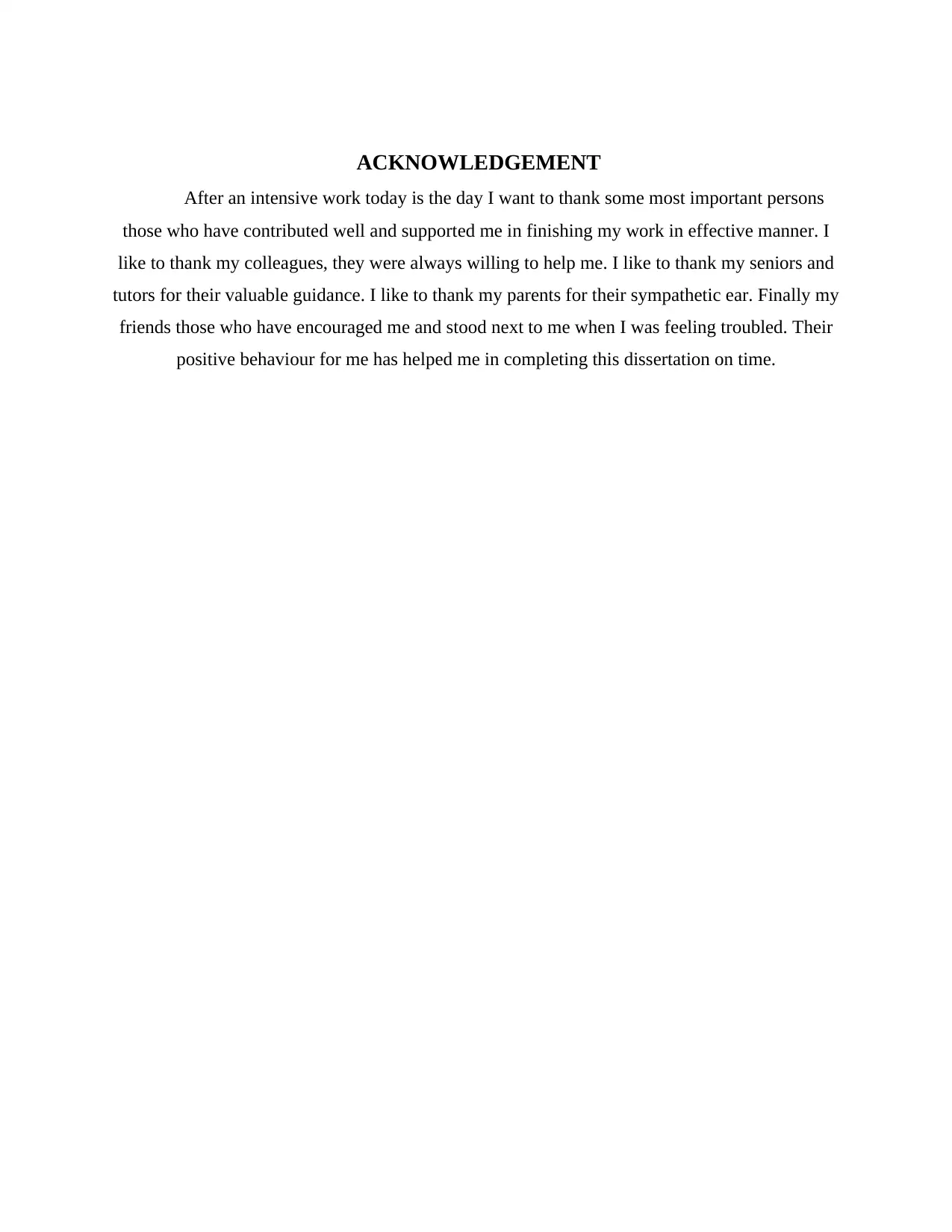
ACKNOWLEDGEMENT
After an intensive work today is the day I want to thank some most important persons
those who have contributed well and supported me in finishing my work in effective manner. I
like to thank my colleagues, they were always willing to help me. I like to thank my seniors and
tutors for their valuable guidance. I like to thank my parents for their sympathetic ear. Finally my
friends those who have encouraged me and stood next to me when I was feeling troubled. Their
positive behaviour for me has helped me in completing this dissertation on time.
After an intensive work today is the day I want to thank some most important persons
those who have contributed well and supported me in finishing my work in effective manner. I
like to thank my colleagues, they were always willing to help me. I like to thank my seniors and
tutors for their valuable guidance. I like to thank my parents for their sympathetic ear. Finally my
friends those who have encouraged me and stood next to me when I was feeling troubled. Their
positive behaviour for me has helped me in completing this dissertation on time.
⊘ This is a preview!⊘
Do you want full access?
Subscribe today to unlock all pages.

Trusted by 1+ million students worldwide
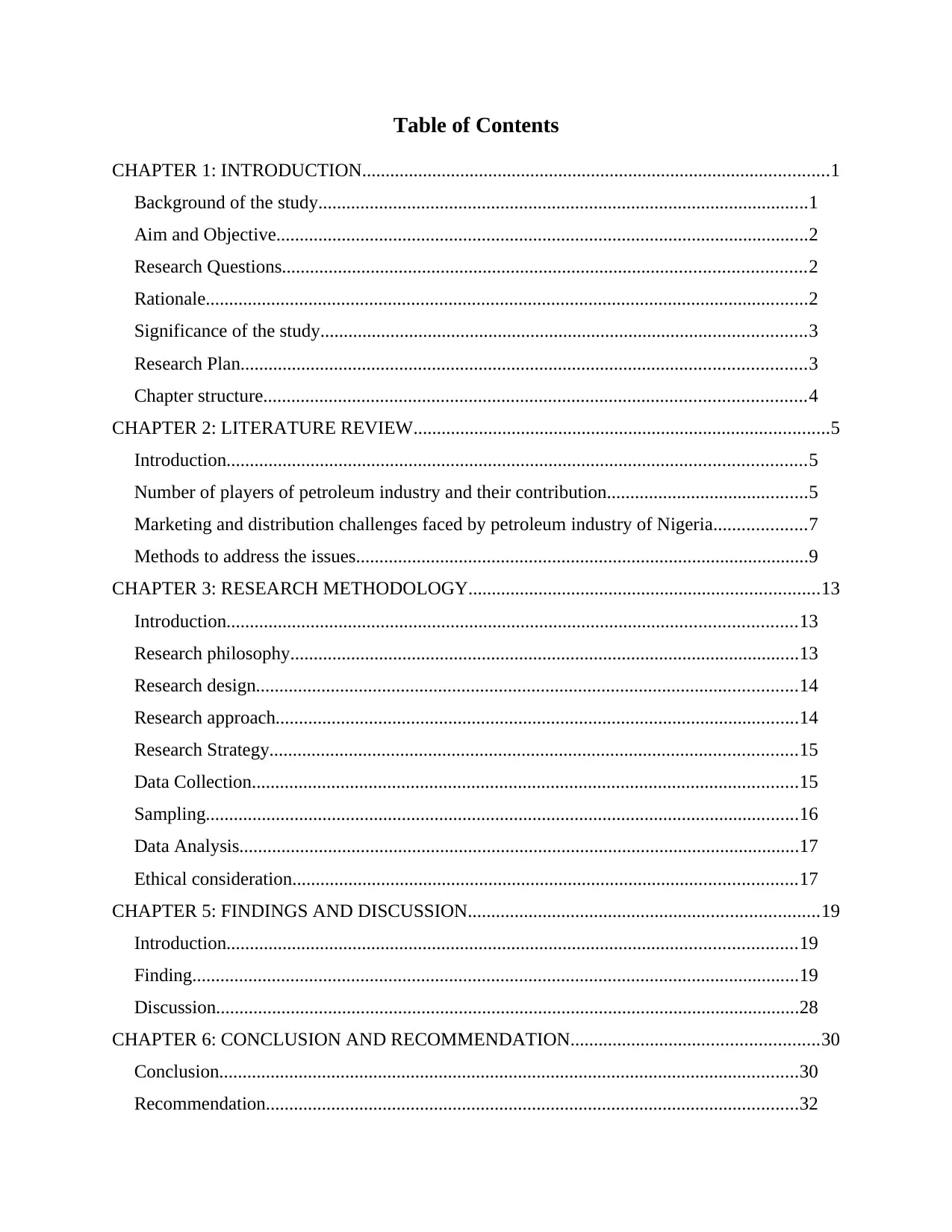
Table of Contents
CHAPTER 1: INTRODUCTION....................................................................................................1
Background of the study.........................................................................................................1
Aim and Objective..................................................................................................................2
Research Questions................................................................................................................2
Rationale.................................................................................................................................2
Significance of the study........................................................................................................3
Research Plan.........................................................................................................................3
Chapter structure....................................................................................................................4
CHAPTER 2: LITERATURE REVIEW.........................................................................................5
Introduction............................................................................................................................5
Number of players of petroleum industry and their contribution...........................................5
Marketing and distribution challenges faced by petroleum industry of Nigeria....................7
Methods to address the issues.................................................................................................9
CHAPTER 3: RESEARCH METHODOLOGY...........................................................................13
Introduction..........................................................................................................................13
Research philosophy.............................................................................................................13
Research design....................................................................................................................14
Research approach................................................................................................................14
Research Strategy.................................................................................................................15
Data Collection.....................................................................................................................15
Sampling...............................................................................................................................16
Data Analysis........................................................................................................................17
Ethical consideration............................................................................................................17
CHAPTER 5: FINDINGS AND DISCUSSION...........................................................................19
Introduction..........................................................................................................................19
Finding..................................................................................................................................19
Discussion.............................................................................................................................28
CHAPTER 6: CONCLUSION AND RECOMMENDATION.....................................................30
Conclusion............................................................................................................................30
Recommendation..................................................................................................................32
CHAPTER 1: INTRODUCTION....................................................................................................1
Background of the study.........................................................................................................1
Aim and Objective..................................................................................................................2
Research Questions................................................................................................................2
Rationale.................................................................................................................................2
Significance of the study........................................................................................................3
Research Plan.........................................................................................................................3
Chapter structure....................................................................................................................4
CHAPTER 2: LITERATURE REVIEW.........................................................................................5
Introduction............................................................................................................................5
Number of players of petroleum industry and their contribution...........................................5
Marketing and distribution challenges faced by petroleum industry of Nigeria....................7
Methods to address the issues.................................................................................................9
CHAPTER 3: RESEARCH METHODOLOGY...........................................................................13
Introduction..........................................................................................................................13
Research philosophy.............................................................................................................13
Research design....................................................................................................................14
Research approach................................................................................................................14
Research Strategy.................................................................................................................15
Data Collection.....................................................................................................................15
Sampling...............................................................................................................................16
Data Analysis........................................................................................................................17
Ethical consideration............................................................................................................17
CHAPTER 5: FINDINGS AND DISCUSSION...........................................................................19
Introduction..........................................................................................................................19
Finding..................................................................................................................................19
Discussion.............................................................................................................................28
CHAPTER 6: CONCLUSION AND RECOMMENDATION.....................................................30
Conclusion............................................................................................................................30
Recommendation..................................................................................................................32
Paraphrase This Document
Need a fresh take? Get an instant paraphrase of this document with our AI Paraphraser
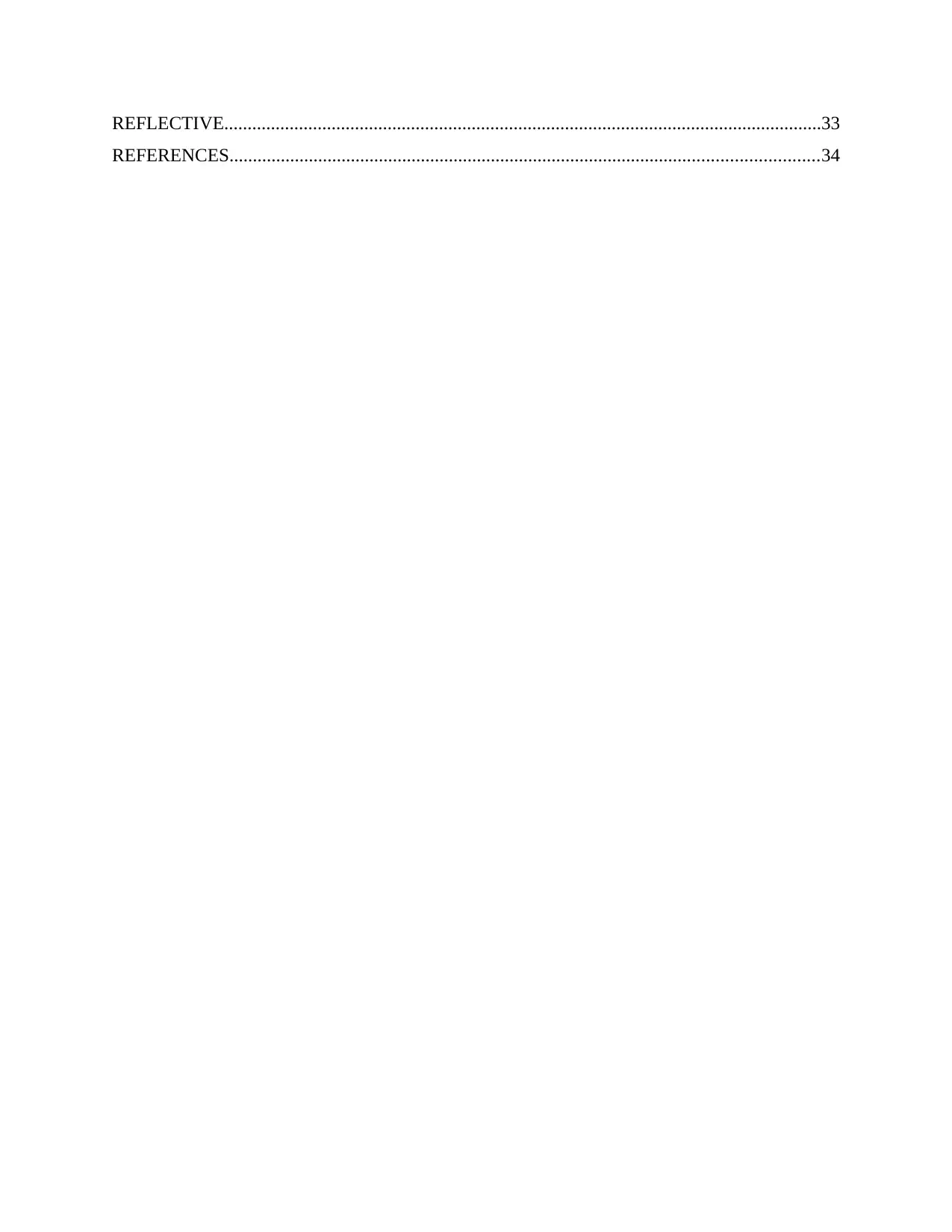
REFLECTIVE................................................................................................................................33
REFERENCES..............................................................................................................................34
REFERENCES..............................................................................................................................34
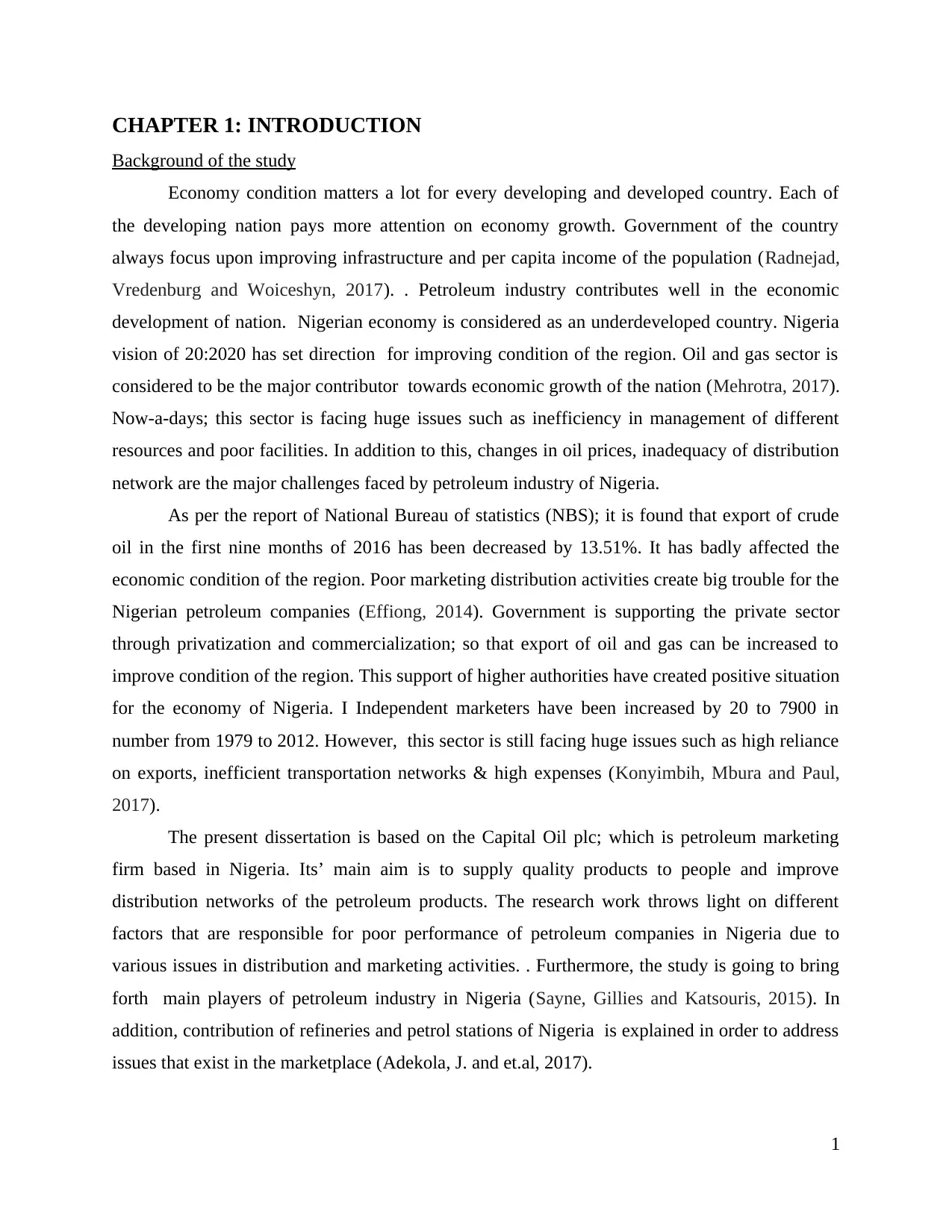
CHAPTER 1: INTRODUCTION
Background of the study
Economy condition matters a lot for every developing and developed country. Each of
the developing nation pays more attention on economy growth. Government of the country
always focus upon improving infrastructure and per capita income of the population (Radnejad,
Vredenburg and Woiceshyn, 2017). . Petroleum industry contributes well in the economic
development of nation. Nigerian economy is considered as an underdeveloped country. Nigeria
vision of 20:2020 has set direction for improving condition of the region. Oil and gas sector is
considered to be the major contributor towards economic growth of the nation (Mehrotra, 2017).
Now-a-days; this sector is facing huge issues such as inefficiency in management of different
resources and poor facilities. In addition to this, changes in oil prices, inadequacy of distribution
network are the major challenges faced by petroleum industry of Nigeria.
As per the report of National Bureau of statistics (NBS); it is found that export of crude
oil in the first nine months of 2016 has been decreased by 13.51%. It has badly affected the
economic condition of the region. Poor marketing distribution activities create big trouble for the
Nigerian petroleum companies (Effiong, 2014). Government is supporting the private sector
through privatization and commercialization; so that export of oil and gas can be increased to
improve condition of the region. This support of higher authorities have created positive situation
for the economy of Nigeria. I Independent marketers have been increased by 20 to 7900 in
number from 1979 to 2012. However, this sector is still facing huge issues such as high reliance
on exports, inefficient transportation networks & high expenses (Konyimbih, Mbura and Paul,
2017).
The present dissertation is based on the Capital Oil plc; which is petroleum marketing
firm based in Nigeria. Its’ main aim is to supply quality products to people and improve
distribution networks of the petroleum products. The research work throws light on different
factors that are responsible for poor performance of petroleum companies in Nigeria due to
various issues in distribution and marketing activities. . Furthermore, the study is going to bring
forth main players of petroleum industry in Nigeria (Sayne, Gillies and Katsouris, 2015). In
addition, contribution of refineries and petrol stations of Nigeria is explained in order to address
issues that exist in the marketplace (Adekola, J. and et.al, 2017).
1
Background of the study
Economy condition matters a lot for every developing and developed country. Each of
the developing nation pays more attention on economy growth. Government of the country
always focus upon improving infrastructure and per capita income of the population (Radnejad,
Vredenburg and Woiceshyn, 2017). . Petroleum industry contributes well in the economic
development of nation. Nigerian economy is considered as an underdeveloped country. Nigeria
vision of 20:2020 has set direction for improving condition of the region. Oil and gas sector is
considered to be the major contributor towards economic growth of the nation (Mehrotra, 2017).
Now-a-days; this sector is facing huge issues such as inefficiency in management of different
resources and poor facilities. In addition to this, changes in oil prices, inadequacy of distribution
network are the major challenges faced by petroleum industry of Nigeria.
As per the report of National Bureau of statistics (NBS); it is found that export of crude
oil in the first nine months of 2016 has been decreased by 13.51%. It has badly affected the
economic condition of the region. Poor marketing distribution activities create big trouble for the
Nigerian petroleum companies (Effiong, 2014). Government is supporting the private sector
through privatization and commercialization; so that export of oil and gas can be increased to
improve condition of the region. This support of higher authorities have created positive situation
for the economy of Nigeria. I Independent marketers have been increased by 20 to 7900 in
number from 1979 to 2012. However, this sector is still facing huge issues such as high reliance
on exports, inefficient transportation networks & high expenses (Konyimbih, Mbura and Paul,
2017).
The present dissertation is based on the Capital Oil plc; which is petroleum marketing
firm based in Nigeria. Its’ main aim is to supply quality products to people and improve
distribution networks of the petroleum products. The research work throws light on different
factors that are responsible for poor performance of petroleum companies in Nigeria due to
various issues in distribution and marketing activities. . Furthermore, the study is going to bring
forth main players of petroleum industry in Nigeria (Sayne, Gillies and Katsouris, 2015). In
addition, contribution of refineries and petrol stations of Nigeria is explained in order to address
issues that exist in the marketplace (Adekola, J. and et.al, 2017).
1
⊘ This is a preview!⊘
Do you want full access?
Subscribe today to unlock all pages.

Trusted by 1+ million students worldwide
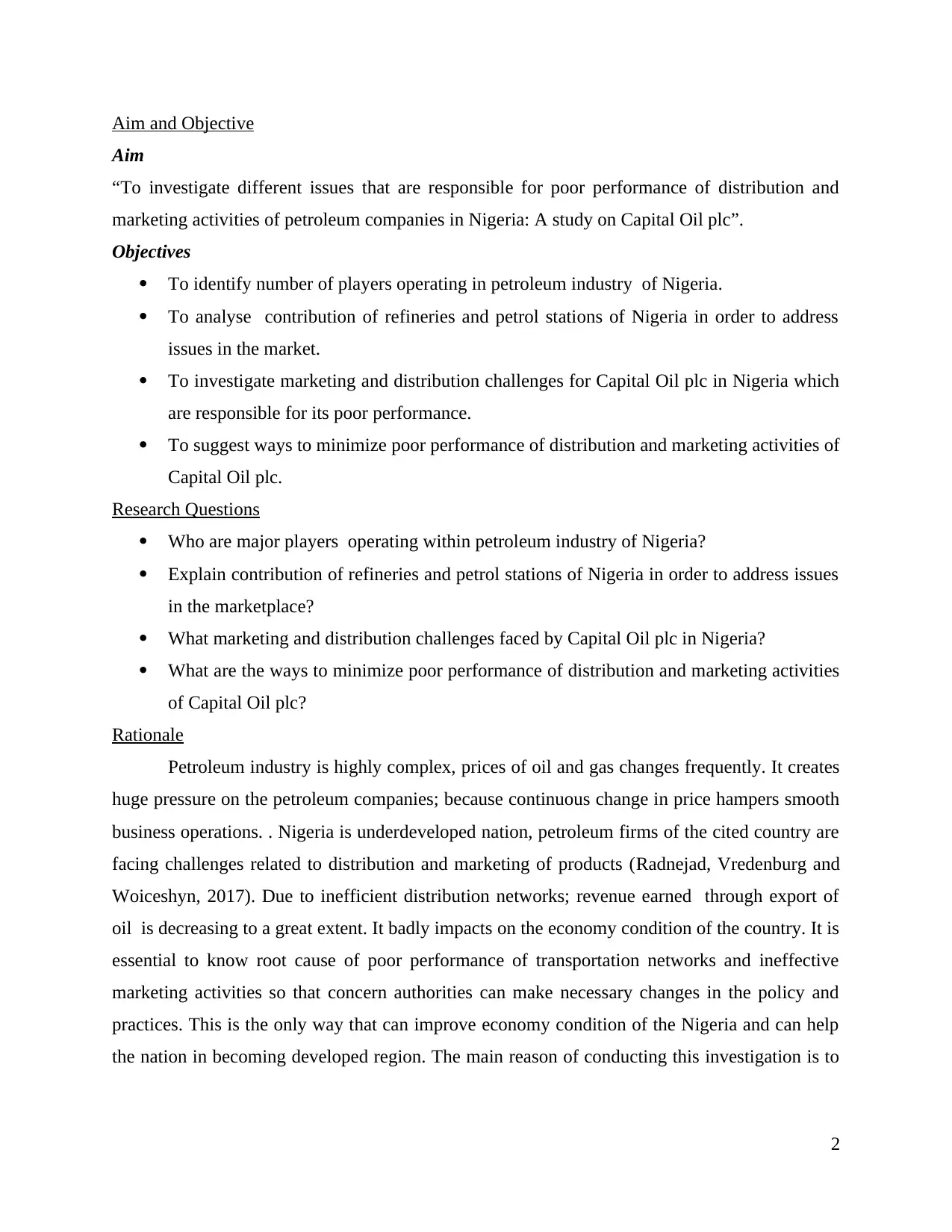
Aim and Objective
Aim
“To investigate different issues that are responsible for poor performance of distribution and
marketing activities of petroleum companies in Nigeria: A study on Capital Oil plc”.
Objectives
To identify number of players operating in petroleum industry of Nigeria.
To analyse contribution of refineries and petrol stations of Nigeria in order to address
issues in the market.
To investigate marketing and distribution challenges for Capital Oil plc in Nigeria which
are responsible for its poor performance.
To suggest ways to minimize poor performance of distribution and marketing activities of
Capital Oil plc.
Research Questions
Who are major players operating within petroleum industry of Nigeria?
Explain contribution of refineries and petrol stations of Nigeria in order to address issues
in the marketplace?
What marketing and distribution challenges faced by Capital Oil plc in Nigeria?
What are the ways to minimize poor performance of distribution and marketing activities
of Capital Oil plc?
Rationale
Petroleum industry is highly complex, prices of oil and gas changes frequently. It creates
huge pressure on the petroleum companies; because continuous change in price hampers smooth
business operations. . Nigeria is underdeveloped nation, petroleum firms of the cited country are
facing challenges related to distribution and marketing of products (Radnejad, Vredenburg and
Woiceshyn, 2017). Due to inefficient distribution networks; revenue earned through export of
oil is decreasing to a great extent. It badly impacts on the economy condition of the country. It is
essential to know root cause of poor performance of transportation networks and ineffective
marketing activities so that concern authorities can make necessary changes in the policy and
practices. This is the only way that can improve economy condition of the Nigeria and can help
the nation in becoming developed region. The main reason of conducting this investigation is to
2
Aim
“To investigate different issues that are responsible for poor performance of distribution and
marketing activities of petroleum companies in Nigeria: A study on Capital Oil plc”.
Objectives
To identify number of players operating in petroleum industry of Nigeria.
To analyse contribution of refineries and petrol stations of Nigeria in order to address
issues in the market.
To investigate marketing and distribution challenges for Capital Oil plc in Nigeria which
are responsible for its poor performance.
To suggest ways to minimize poor performance of distribution and marketing activities of
Capital Oil plc.
Research Questions
Who are major players operating within petroleum industry of Nigeria?
Explain contribution of refineries and petrol stations of Nigeria in order to address issues
in the marketplace?
What marketing and distribution challenges faced by Capital Oil plc in Nigeria?
What are the ways to minimize poor performance of distribution and marketing activities
of Capital Oil plc?
Rationale
Petroleum industry is highly complex, prices of oil and gas changes frequently. It creates
huge pressure on the petroleum companies; because continuous change in price hampers smooth
business operations. . Nigeria is underdeveloped nation, petroleum firms of the cited country are
facing challenges related to distribution and marketing of products (Radnejad, Vredenburg and
Woiceshyn, 2017). Due to inefficient distribution networks; revenue earned through export of
oil is decreasing to a great extent. It badly impacts on the economy condition of the country. It is
essential to know root cause of poor performance of transportation networks and ineffective
marketing activities so that concern authorities can make necessary changes in the policy and
practices. This is the only way that can improve economy condition of the Nigeria and can help
the nation in becoming developed region. The main reason of conducting this investigation is to
2
Paraphrase This Document
Need a fresh take? Get an instant paraphrase of this document with our AI Paraphraser
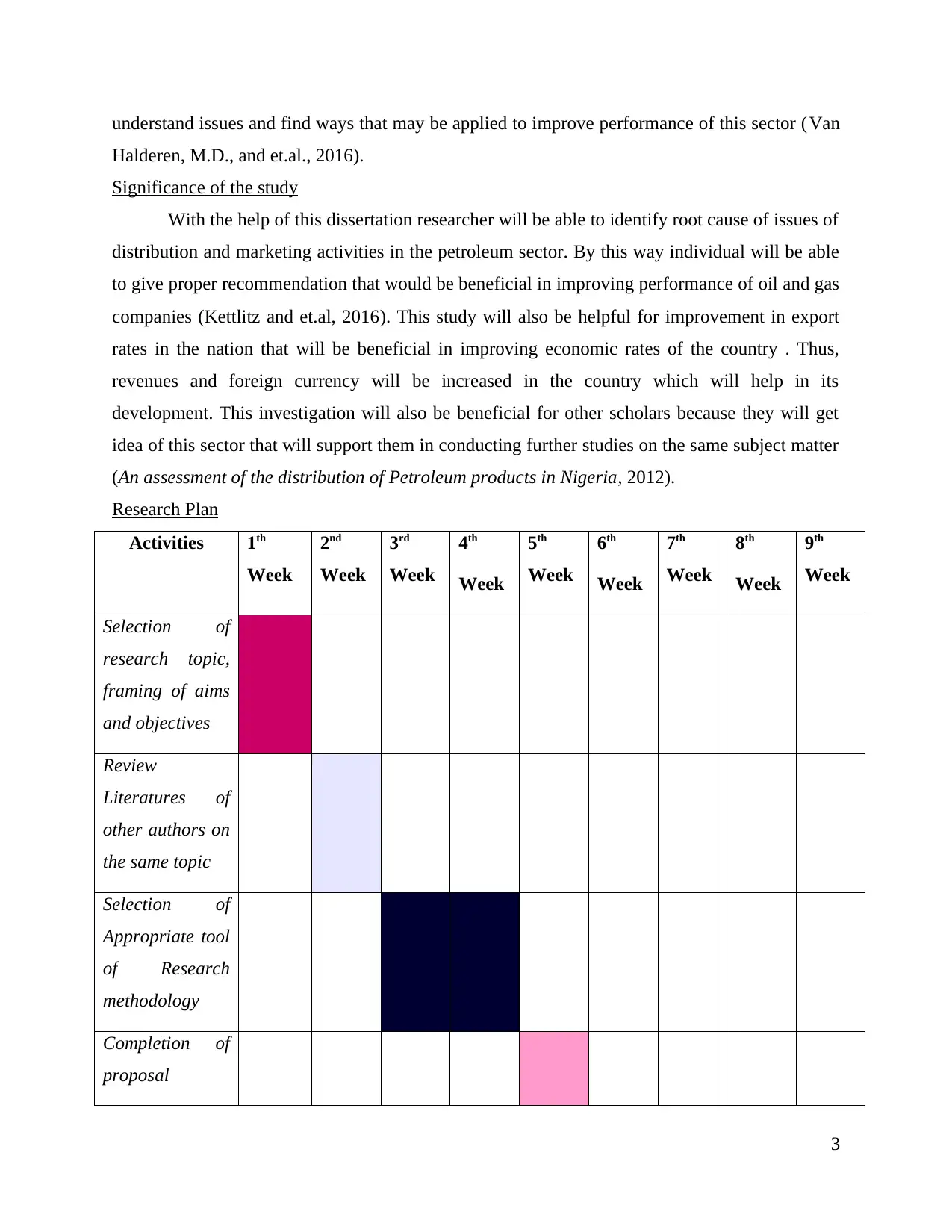
understand issues and find ways that may be applied to improve performance of this sector (Van
Halderen, M.D., and et.al., 2016).
Significance of the study
With the help of this dissertation researcher will be able to identify root cause of issues of
distribution and marketing activities in the petroleum sector. By this way individual will be able
to give proper recommendation that would be beneficial in improving performance of oil and gas
companies (Kettlitz and et.al, 2016). This study will also be helpful for improvement in export
rates in the nation that will be beneficial in improving economic rates of the country . Thus,
revenues and foreign currency will be increased in the country which will help in its
development. This investigation will also be beneficial for other scholars because they will get
idea of this sector that will support them in conducting further studies on the same subject matter
(An assessment of the distribution of Petroleum products in Nigeria, 2012).
Research Plan
Activities 1th
Week
2nd
Week
3rd
Week
4th
Week
5th
Week
6th
Week
7th
Week
8th
Week
9th
Week
Selection of
research topic,
framing of aims
and objectives
Review
Literatures of
other authors on
the same topic
Selection of
Appropriate tool
of Research
methodology
Completion of
proposal
3
Halderen, M.D., and et.al., 2016).
Significance of the study
With the help of this dissertation researcher will be able to identify root cause of issues of
distribution and marketing activities in the petroleum sector. By this way individual will be able
to give proper recommendation that would be beneficial in improving performance of oil and gas
companies (Kettlitz and et.al, 2016). This study will also be helpful for improvement in export
rates in the nation that will be beneficial in improving economic rates of the country . Thus,
revenues and foreign currency will be increased in the country which will help in its
development. This investigation will also be beneficial for other scholars because they will get
idea of this sector that will support them in conducting further studies on the same subject matter
(An assessment of the distribution of Petroleum products in Nigeria, 2012).
Research Plan
Activities 1th
Week
2nd
Week
3rd
Week
4th
Week
5th
Week
6th
Week
7th
Week
8th
Week
9th
Week
Selection of
research topic,
framing of aims
and objectives
Review
Literatures of
other authors on
the same topic
Selection of
Appropriate tool
of Research
methodology
Completion of
proposal
3
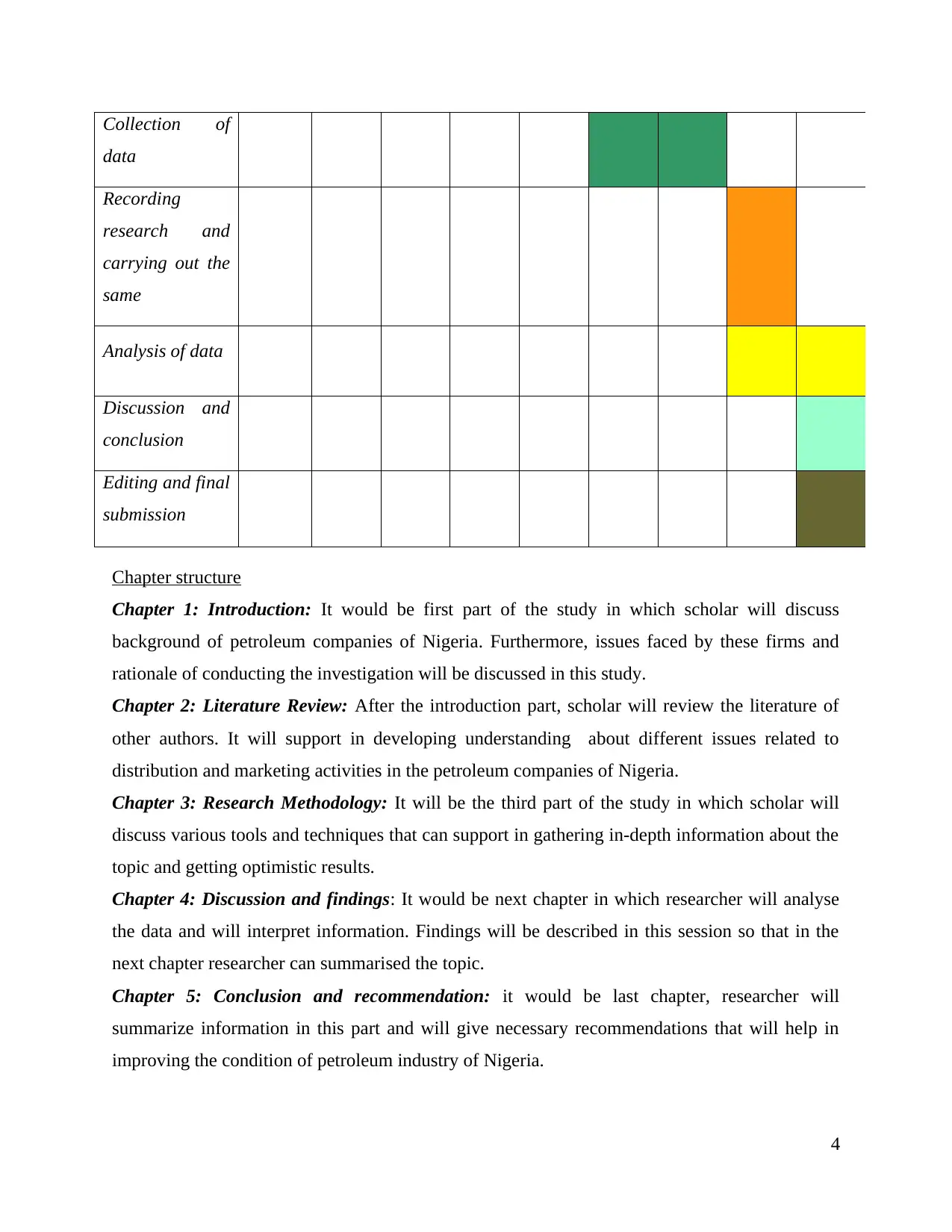
Collection of
data
Recording
research and
carrying out the
same
Analysis of data
Discussion and
conclusion
Editing and final
submission
Chapter structure
Chapter 1: Introduction: It would be first part of the study in which scholar will discuss
background of petroleum companies of Nigeria. Furthermore, issues faced by these firms and
rationale of conducting the investigation will be discussed in this study.
Chapter 2: Literature Review: After the introduction part, scholar will review the literature of
other authors. It will support in developing understanding about different issues related to
distribution and marketing activities in the petroleum companies of Nigeria.
Chapter 3: Research Methodology: It will be the third part of the study in which scholar will
discuss various tools and techniques that can support in gathering in-depth information about the
topic and getting optimistic results.
Chapter 4: Discussion and findings: It would be next chapter in which researcher will analyse
the data and will interpret information. Findings will be described in this session so that in the
next chapter researcher can summarised the topic.
Chapter 5: Conclusion and recommendation: it would be last chapter, researcher will
summarize information in this part and will give necessary recommendations that will help in
improving the condition of petroleum industry of Nigeria.
4
data
Recording
research and
carrying out the
same
Analysis of data
Discussion and
conclusion
Editing and final
submission
Chapter structure
Chapter 1: Introduction: It would be first part of the study in which scholar will discuss
background of petroleum companies of Nigeria. Furthermore, issues faced by these firms and
rationale of conducting the investigation will be discussed in this study.
Chapter 2: Literature Review: After the introduction part, scholar will review the literature of
other authors. It will support in developing understanding about different issues related to
distribution and marketing activities in the petroleum companies of Nigeria.
Chapter 3: Research Methodology: It will be the third part of the study in which scholar will
discuss various tools and techniques that can support in gathering in-depth information about the
topic and getting optimistic results.
Chapter 4: Discussion and findings: It would be next chapter in which researcher will analyse
the data and will interpret information. Findings will be described in this session so that in the
next chapter researcher can summarised the topic.
Chapter 5: Conclusion and recommendation: it would be last chapter, researcher will
summarize information in this part and will give necessary recommendations that will help in
improving the condition of petroleum industry of Nigeria.
4
⊘ This is a preview!⊘
Do you want full access?
Subscribe today to unlock all pages.

Trusted by 1+ million students worldwide

CHAPTER 2: LITERATURE REVIEW
Introduction
Literature review is considered as one of the most important part of dissertation. It
supports in gaining in-depth information about the topic by reviewing other researcher's
literatures on the same topic.
Number of players of petroleum industry and their contribution
According to Radnejad, Vredenburg and Woiceshyn (2017), petroleum industry of
Nigeria highly contributes in the economy development of the nation. In the year of 2016 9%
contribution has been done by the oil and gas companies of Nigeria. Mehrotra, (2017), stated that
petroleum industry contribute well in the economy development of the nation. It is the sector that
supports in foreign exchange earnings. Major foreign exchange is generated from crude oil
exports. This contribution has increased revenues of government. Income generated by
petroleum profit tax helps the government in development of the nation. Oil refinery is an
industrial process plan where oil and gas companies processed the crude oil and refined it into
the useful products. Van Halderen, M.D. and et.al. (2016), argued that refineries contributes well
in re-busting the petroleum industry. It helps the Nigerian country in continuously growing,
moving and thriving (Mohammed and et.al, 2014.). Refining industry plays significant role by
providing companies vital products. These are the main suppliers of transportation fuels thus,
play role of facilitating mobility. Refineries help in providing gasoline, fuel oil for maritime
transport. It is the sector which helps in fulfilling the energy needs of Nigeria.
During the year of 2011 & 2012; petroleum sector of Nigeria has altered the situation of
the territorial division, exports earning have been increased by 95% and 58% government
revenues have been raised due to effective working of oil and gas companies
Kettlitz and et.al. (2016), refineries not only supports in increasing export of oil and gas
products but also helps in increasing job opportunities in the nation. This refinery industry
fosters apprenticeship programs which assist in the development of nation and meeting with the
energy needs of Nigeria. Refiners provide resilient and flexible infrastructure system to the
nation. Adekola and et.al. (2017), argued that in recent era refining capacity are changing
frequently at international level. Increasing energy needs has forced to upgrade refining capacity
to great extent. Refiners has strength to have strong export orientation but due to poor local
deman Negieria is still lacking in meeting with its objectives (Ibe and et.al, 2015).
5
Introduction
Literature review is considered as one of the most important part of dissertation. It
supports in gaining in-depth information about the topic by reviewing other researcher's
literatures on the same topic.
Number of players of petroleum industry and their contribution
According to Radnejad, Vredenburg and Woiceshyn (2017), petroleum industry of
Nigeria highly contributes in the economy development of the nation. In the year of 2016 9%
contribution has been done by the oil and gas companies of Nigeria. Mehrotra, (2017), stated that
petroleum industry contribute well in the economy development of the nation. It is the sector that
supports in foreign exchange earnings. Major foreign exchange is generated from crude oil
exports. This contribution has increased revenues of government. Income generated by
petroleum profit tax helps the government in development of the nation. Oil refinery is an
industrial process plan where oil and gas companies processed the crude oil and refined it into
the useful products. Van Halderen, M.D. and et.al. (2016), argued that refineries contributes well
in re-busting the petroleum industry. It helps the Nigerian country in continuously growing,
moving and thriving (Mohammed and et.al, 2014.). Refining industry plays significant role by
providing companies vital products. These are the main suppliers of transportation fuels thus,
play role of facilitating mobility. Refineries help in providing gasoline, fuel oil for maritime
transport. It is the sector which helps in fulfilling the energy needs of Nigeria.
During the year of 2011 & 2012; petroleum sector of Nigeria has altered the situation of
the territorial division, exports earning have been increased by 95% and 58% government
revenues have been raised due to effective working of oil and gas companies
Kettlitz and et.al. (2016), refineries not only supports in increasing export of oil and gas
products but also helps in increasing job opportunities in the nation. This refinery industry
fosters apprenticeship programs which assist in the development of nation and meeting with the
energy needs of Nigeria. Refiners provide resilient and flexible infrastructure system to the
nation. Adekola and et.al. (2017), argued that in recent era refining capacity are changing
frequently at international level. Increasing energy needs has forced to upgrade refining capacity
to great extent. Refiners has strength to have strong export orientation but due to poor local
deman Negieria is still lacking in meeting with its objectives (Ibe and et.al, 2015).
5
Paraphrase This Document
Need a fresh take? Get an instant paraphrase of this document with our AI Paraphraser
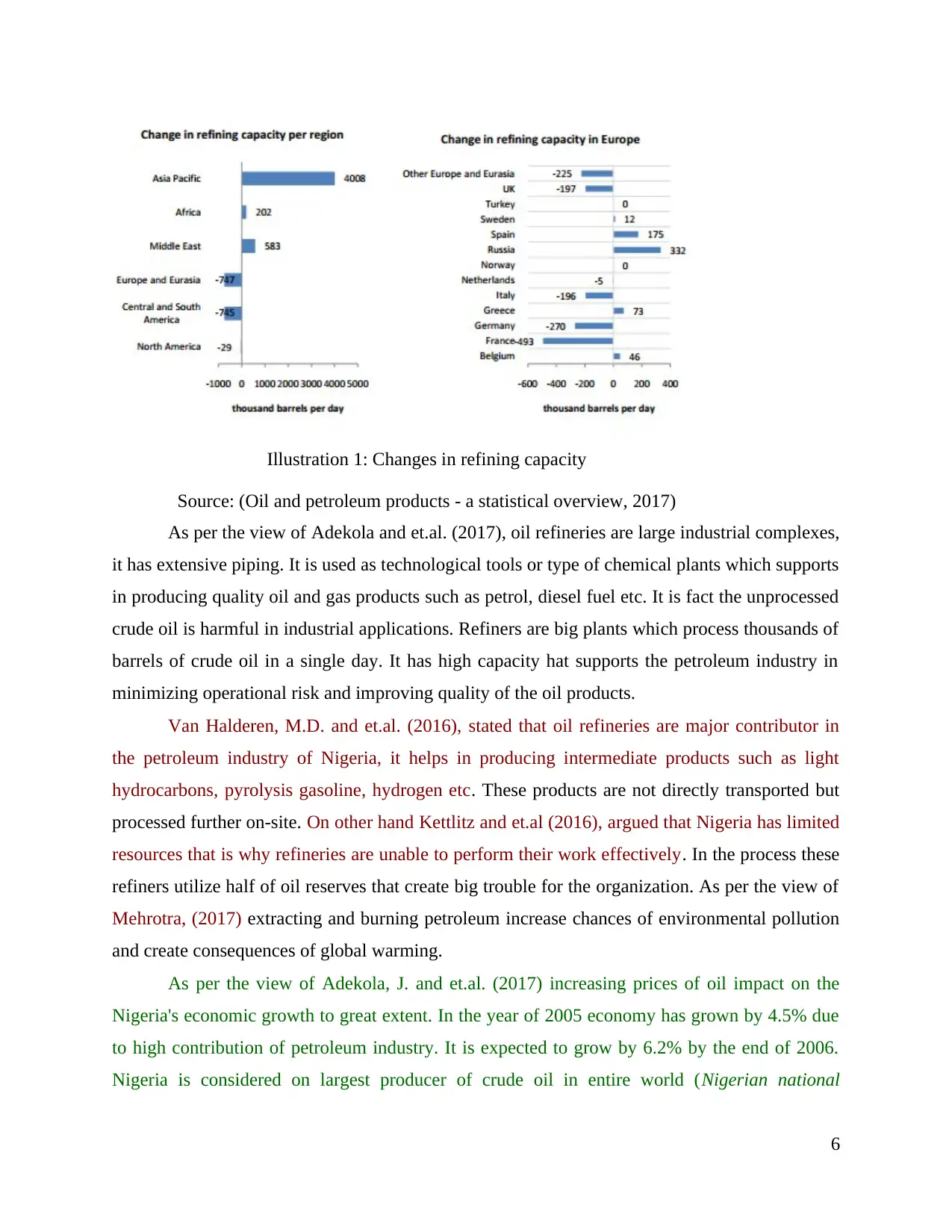
Illustration 1: Changes in refining capacity
Source: (Oil and petroleum products - a statistical overview, 2017)
As per the view of Adekola and et.al. (2017), oil refineries are large industrial complexes,
it has extensive piping. It is used as technological tools or type of chemical plants which supports
in producing quality oil and gas products such as petrol, diesel fuel etc. It is fact the unprocessed
crude oil is harmful in industrial applications. Refiners are big plants which process thousands of
barrels of crude oil in a single day. It has high capacity hat supports the petroleum industry in
minimizing operational risk and improving quality of the oil products.
Van Halderen, M.D. and et.al. (2016), stated that oil refineries are major contributor in
the petroleum industry of Nigeria, it helps in producing intermediate products such as light
hydrocarbons, pyrolysis gasoline, hydrogen etc. These products are not directly transported but
processed further on-site. On other hand Kettlitz and et.al (2016), argued that Nigeria has limited
resources that is why refineries are unable to perform their work effectively. In the process these
refiners utilize half of oil reserves that create big trouble for the organization. As per the view of
Mehrotra, (2017) extracting and burning petroleum increase chances of environmental pollution
and create consequences of global warming.
As per the view of Adekola, J. and et.al. (2017) increasing prices of oil impact on the
Nigeria's economic growth to great extent. In the year of 2005 economy has grown by 4.5% due
to high contribution of petroleum industry. It is expected to grow by 6.2% by the end of 2006.
Nigeria is considered on largest producer of crude oil in entire world (Nigerian national
6
Source: (Oil and petroleum products - a statistical overview, 2017)
As per the view of Adekola and et.al. (2017), oil refineries are large industrial complexes,
it has extensive piping. It is used as technological tools or type of chemical plants which supports
in producing quality oil and gas products such as petrol, diesel fuel etc. It is fact the unprocessed
crude oil is harmful in industrial applications. Refiners are big plants which process thousands of
barrels of crude oil in a single day. It has high capacity hat supports the petroleum industry in
minimizing operational risk and improving quality of the oil products.
Van Halderen, M.D. and et.al. (2016), stated that oil refineries are major contributor in
the petroleum industry of Nigeria, it helps in producing intermediate products such as light
hydrocarbons, pyrolysis gasoline, hydrogen etc. These products are not directly transported but
processed further on-site. On other hand Kettlitz and et.al (2016), argued that Nigeria has limited
resources that is why refineries are unable to perform their work effectively. In the process these
refiners utilize half of oil reserves that create big trouble for the organization. As per the view of
Mehrotra, (2017) extracting and burning petroleum increase chances of environmental pollution
and create consequences of global warming.
As per the view of Adekola, J. and et.al. (2017) increasing prices of oil impact on the
Nigeria's economic growth to great extent. In the year of 2005 economy has grown by 4.5% due
to high contribution of petroleum industry. It is expected to grow by 6.2% by the end of 2006.
Nigeria is considered on largest producer of crude oil in entire world (Nigerian national
6
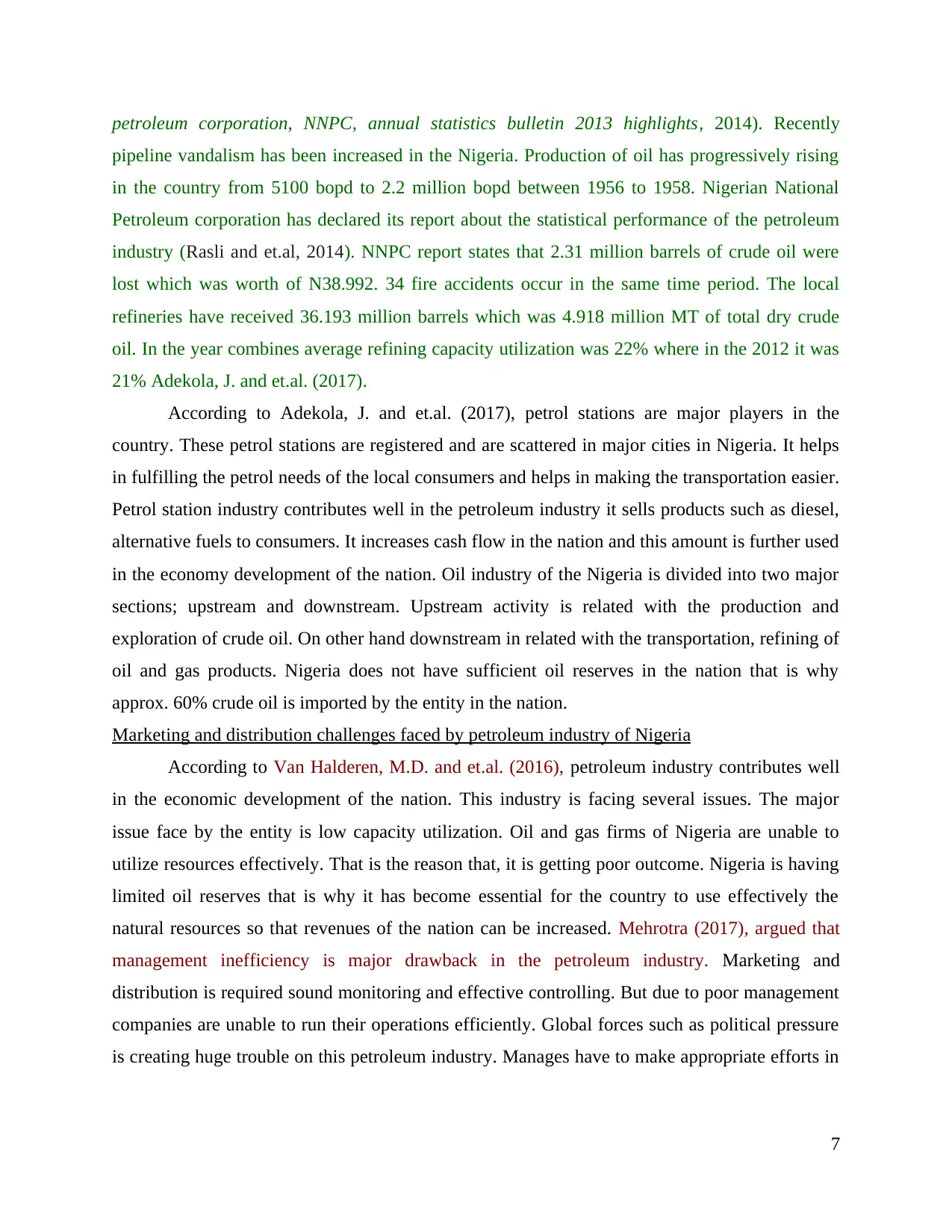
petroleum corporation, NNPC, annual statistics bulletin 2013 highlights, 2014). Recently
pipeline vandalism has been increased in the Nigeria. Production of oil has progressively rising
in the country from 5100 bopd to 2.2 million bopd between 1956 to 1958. Nigerian National
Petroleum corporation has declared its report about the statistical performance of the petroleum
industry (Rasli and et.al, 2014). NNPC report states that 2.31 million barrels of crude oil were
lost which was worth of N38.992. 34 fire accidents occur in the same time period. The local
refineries have received 36.193 million barrels which was 4.918 million MT of total dry crude
oil. In the year combines average refining capacity utilization was 22% where in the 2012 it was
21% Adekola, J. and et.al. (2017).
According to Adekola, J. and et.al. (2017), petrol stations are major players in the
country. These petrol stations are registered and are scattered in major cities in Nigeria. It helps
in fulfilling the petrol needs of the local consumers and helps in making the transportation easier.
Petrol station industry contributes well in the petroleum industry it sells products such as diesel,
alternative fuels to consumers. It increases cash flow in the nation and this amount is further used
in the economy development of the nation. Oil industry of the Nigeria is divided into two major
sections; upstream and downstream. Upstream activity is related with the production and
exploration of crude oil. On other hand downstream in related with the transportation, refining of
oil and gas products. Nigeria does not have sufficient oil reserves in the nation that is why
approx. 60% crude oil is imported by the entity in the nation.
Marketing and distribution challenges faced by petroleum industry of Nigeria
According to Van Halderen, M.D. and et.al. (2016), petroleum industry contributes well
in the economic development of the nation. This industry is facing several issues. The major
issue face by the entity is low capacity utilization. Oil and gas firms of Nigeria are unable to
utilize resources effectively. That is the reason that, it is getting poor outcome. Nigeria is having
limited oil reserves that is why it has become essential for the country to use effectively the
natural resources so that revenues of the nation can be increased. Mehrotra (2017), argued that
management inefficiency is major drawback in the petroleum industry. Marketing and
distribution is required sound monitoring and effective controlling. But due to poor management
companies are unable to run their operations efficiently. Global forces such as political pressure
is creating huge trouble on this petroleum industry. Manages have to make appropriate efforts in
7
pipeline vandalism has been increased in the Nigeria. Production of oil has progressively rising
in the country from 5100 bopd to 2.2 million bopd between 1956 to 1958. Nigerian National
Petroleum corporation has declared its report about the statistical performance of the petroleum
industry (Rasli and et.al, 2014). NNPC report states that 2.31 million barrels of crude oil were
lost which was worth of N38.992. 34 fire accidents occur in the same time period. The local
refineries have received 36.193 million barrels which was 4.918 million MT of total dry crude
oil. In the year combines average refining capacity utilization was 22% where in the 2012 it was
21% Adekola, J. and et.al. (2017).
According to Adekola, J. and et.al. (2017), petrol stations are major players in the
country. These petrol stations are registered and are scattered in major cities in Nigeria. It helps
in fulfilling the petrol needs of the local consumers and helps in making the transportation easier.
Petrol station industry contributes well in the petroleum industry it sells products such as diesel,
alternative fuels to consumers. It increases cash flow in the nation and this amount is further used
in the economy development of the nation. Oil industry of the Nigeria is divided into two major
sections; upstream and downstream. Upstream activity is related with the production and
exploration of crude oil. On other hand downstream in related with the transportation, refining of
oil and gas products. Nigeria does not have sufficient oil reserves in the nation that is why
approx. 60% crude oil is imported by the entity in the nation.
Marketing and distribution challenges faced by petroleum industry of Nigeria
According to Van Halderen, M.D. and et.al. (2016), petroleum industry contributes well
in the economic development of the nation. This industry is facing several issues. The major
issue face by the entity is low capacity utilization. Oil and gas firms of Nigeria are unable to
utilize resources effectively. That is the reason that, it is getting poor outcome. Nigeria is having
limited oil reserves that is why it has become essential for the country to use effectively the
natural resources so that revenues of the nation can be increased. Mehrotra (2017), argued that
management inefficiency is major drawback in the petroleum industry. Marketing and
distribution is required sound monitoring and effective controlling. But due to poor management
companies are unable to run their operations efficiently. Global forces such as political pressure
is creating huge trouble on this petroleum industry. Manages have to make appropriate efforts in
7
⊘ This is a preview!⊘
Do you want full access?
Subscribe today to unlock all pages.

Trusted by 1+ million students worldwide
1 out of 44
Related Documents
Your All-in-One AI-Powered Toolkit for Academic Success.
+13062052269
info@desklib.com
Available 24*7 on WhatsApp / Email
![[object Object]](/_next/static/media/star-bottom.7253800d.svg)
Unlock your academic potential
Copyright © 2020–2026 A2Z Services. All Rights Reserved. Developed and managed by ZUCOL.





